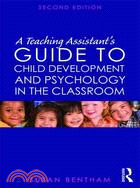| FindBook |
|
有 1 項符合
Susan Bentham的圖書 |
 |
$ 1169 ~ 1759 | A Teaching Assistant's Guide to Child Development and Psychology in the Classroom Second edition, 2nd Edition
作者:Susan Bentham 出版社:Routledge 出版日期:2011-03-30 規格: / 218頁  共 2 筆 → 查價格、看圖書介紹 共 2 筆 → 查價格、看圖書介紹
|
|
|
- 圖書簡介
How can you help students most effectively in the classroom? As a Teaching Assistant, you play a vital role in today’s schools. This fully updated new edition will help you get to grips with the main issues to do with psychology and its role in the processes of teaching and learning.
This accessible text, building on the success of a best-selling previous edition, provides informative, yet down-to-earth commentary with clear examples of how you can apply this knowledge in everyday practice.
The book addresses issues including:
how to support learning
how to identify and cater for different learning styles
teaching children with additional needs
how to manage behaviour to support learning
how to help children with their self-esteem and independence.
This new edition includes references to up-to-date research in child development and psychology to include information regarding personalised learning, creativity, motivation, friendships skills, moral development and neuroscience. Chapters are complemented with lively case studies, self-assessment questions and examples of how to apply theory to everyday classroom practice. The reader is encouraged to develop reflective practice to best support childrens’ behaviour and learning.
This reader-friendly book is an invaluable companion for every Teaching assistant, HLTA, Cover Supervisor, and anyone working in a supporting role in an educational setting. - 作者簡介
Susan Bentham is Senior Lecturer in Education at the University of Chichester. She is the author of A Teaching Assistant's Guide to Managing Behaviour in the Classroom and guides for teaching assistants to complete NVQ Levels 2 and 3 (all published by Routledge).
- 目次
Introduction 1. Basic principles underlying pupil development and learning 2. Learning support strategies 3. Learning styles 4. Pupils with additional needs 5. Managing Behaviour for Learning 6. Establishing effective working relationships with pupils and colleagues 7. Self-esteem, Motivation and independent learners
|











